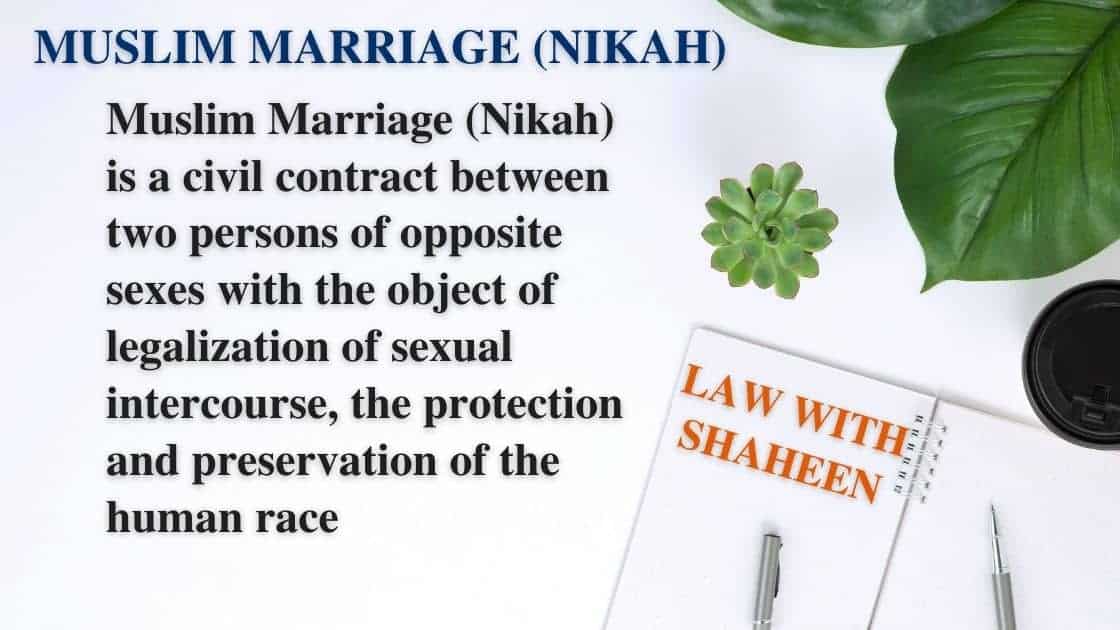Table of Contents
Muslim Marriage(Nikah):
Muslim Marriage(Nikah) is the central institution around which the whole family life revolves. Marriage is a process or a way through which a male and female become legal to one another in sexual activities. The procedure of Marriage is different in every religion. Hence, we will discuss here Muslim Marriage(Nikah) in detail.
Definitions of Muslim Marriage(Nikah):
According to common parlance;
“Marriage (Nikah) is a civil contract between two persons of opposite sexes with the object of legalization of sexual intercourse, the protection, and preservation of the human race”.
Muhammadan Law says,
“Marriage(Nikah) is a contract for the legalization of sexual intercourse and protection of children”.
Purpose and Objects of Muslim Marriage in Islam:
The objects and purposes of marriage nikah in Islam are:
- Protection of normal family life;
- Avoidance from foulness and immorality;
- Legalization of children;
- Legalization of sexual intercourse;
- Preservation of the human race; and
- Systematization of domestic life.
Essentials of Valid Marriage:
The following are the essentials of a valid marriage: –
- Offer (Aijab)
- Acceptance (Qabool)
- Capacity (Ahliat)
- Free Consent (Raza)
- One sitting (Majlis)
- Clear and unambiguous
- Presence of witness
- Dower (Mehr)
Kinds of Muslim Marriage Nikah:
Muslim marriage Nikah can be classified into the following heads according to the nature of time duration involved: –
- Permanent Marriage
- Temporary Marriage
Permanent Marriage Nikah and their Legal Effects:
Permanent marriage is recognized by both Shia and Sunni Schools. Muslim marriage can be sub-divided into three categories on the basis of the existence of prohibitions: –
- Valid Marriage (Sahih)
- Void Marriage (Batil)
- Irregular Marriage (Fasid)
Valid Marriage(Nikah):
These are the marriages that fulfill all the requirements as prescribed by the Sharia. They create all sorts of legal rights provided and protected under Islam, such as:
- A sexual relationship becomes lawful
- Children born as a result of wedlock are legitimate
- The wife has the right to receive dower
- The wife has the right to maintenance and residence
Void Marriage:
These are treated as void ab initio and the defect due to which they are not validated cannot be cured. Hence, they create no legal effects whatsoever and the relationship amounts to Zina.
For example:
- A marriage nikah with the wife of another.
- Remarriage with divorced wife where legal bar still exists.
- Marriage with foster and blood relations will be null and void.
Irregular Marriage:
These are not void and are midway between valid and void; however, there exist some defects which can be negated.
Upon curing these defects these marriages become valid. Shia law does not recognize these marriages.
Following marriages are irregular: –
- A marriage without witnesses.
- A marriage with a woman undergoing iddat.
- A marriage is prohibited by reason of a difference in religion.
- A marriage with two sisters.
- A marriage with the fifth wife in the presence of existing four wives.
- A marriage of unlawful conjunction.
Temporary Marriage or Muta:
Temporary marriage is called “Muta” and these are muta marriages for a fixed duration or for a definite period. The literal meaning of muta is enjoyment or use. Shia School recognizes this type of muta marriage and Sunni School treats it as void.
The conclusion is that Muslim Marriage(Nikah) is a civil contract having an element of worship too. It can be classified into permanent and temporary marriages. Only Shia Law recognizes temporary marriages. Sunni Law classifies this institution into three types (valid, void, and irregular) out of which irregular one is not recognized under Shia Law.
You can find us here for our future notes/articles/cases: https://blog.feedspot.com/legal_law_blogs/
